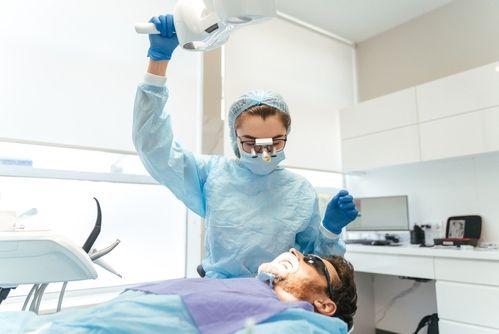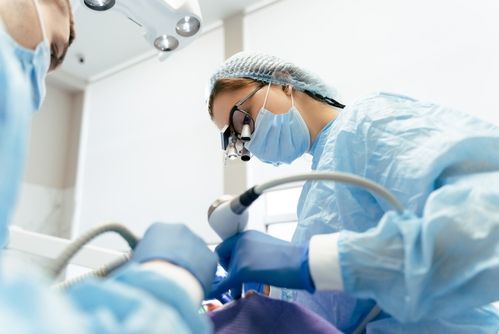Call me back
Oral Surgery Monmouth, South Wales
Oral surgery treatment is usually complex, requiring advanced skills from an oral surgeon to treat conditions effecting the mouth, jaws, face and neck.
Routine surgical procedures such as tooth removal can be carried out by your general dentist, but you may be referred to our specialist oral surgeon at The Mayhill Dental and Specialist Centre for more complex treatments like impacted teeth, complex extractions or removal of buried roots.
Oral surgery treatments explained
Our most common oral surgery treatments that we see at The Mayhill Dental and Specialist Centre are;
Removal of impacted wisdom teeth
Wisdom teeth are generally the last of your teeth to develop. As they grow they sometimes don't have enough room to emerge or develop normally and become impacted on existing teeth.
Impacted wisdom teeth can result in pain, damage to other teeth and other dental problems. In some cases, impacted wisdom teeth may cause no apparent or immediate problems. But because they're hard to clean, they may be more vulnerable to tooth decay and gum disease than other teeth are.
Impacted wisdom teeth that cause pain or other dental complications are usually removed. Some dentists and oral surgeons also recommend removing impacted wisdom teeth that don't cause symptoms to prevent future problems.
At The Mayhill Dental and Specialist Centre in Monmouth, we can perform impacted wisdom tooth removal under dental sedation if required.
Root canal surgery
Root canal surgery (also known as endodontic surgery) may be required when the system at the centre of a tooth has become damaged or infected.
Endodontic surgery from The Mayhill Dental and Specialist Centre can be used to locate small fractures or hidden canals previously undetected on X-rays. Surgery may also be needed to remove calcium deposits in root canals, or to treat damaged root surfaces or the surrounding bone of the tooth.

Complex extractions
Some more complex tooth extractions may require the skills of an oral surgeon. Our oral surgeon is highly experienced and qualified to perform a wide range of surgical dentistry procedures including complex extractions.
Our expert team at The Mayhill Dental and Specialist Centre will be able to guide you through the entire process.

Removal of buried roots
Each of your adult teeth is anchored to your jawbone by up to four roots. These hold your teeth firmly in place and are bound to your jawbone by a fibrous ligament called the periodontal ligament. When a dentist extracts a tooth, these roots are usually removed at the same time.
However, when the loss of a tooth is brought about by decay or accident, some or all of the tooth roots can remain buried in the jaw bone and gums with a risk of infection and pain.
Following a consultation with our dental team, you may be referred to our Monmouth Oral Surgeon for retained root removal surgery.

Worried about your oral surgery treatment?
Our expert team will guide you through your treatment, ensuring you are as comfortable as possible. But if you need some help to feel more relaxed, we can offer dental sedation at The Mayhill Dental and Specialist Centre.
If you have a concern or would like to talk to the team for more advice, give us a call on 01600 712020 .
Dental sedation
Sedation is a great option for nervous patients and anyone who feels anxious about receiving oral surgery treatment. With safe and proven techniques, we administer IV sedation or Oral sedation to place you in a relaxed and dream-like state.
Sedation facts
- It really works! You really can relax through your dental appointment
- When sedated you will be conscious, but unaware of what is going on around you
- You will have little or no memory of the experience
When receiving sedation you will be fully informed beforehand of any potential side effects and given advice to help with your recovery. You will be advised to bring someone along with you to the appointment who is able to take you home afterwards, and it's advisable to rest for the remainder of the day.
You should be back to normal within 24 hours.

